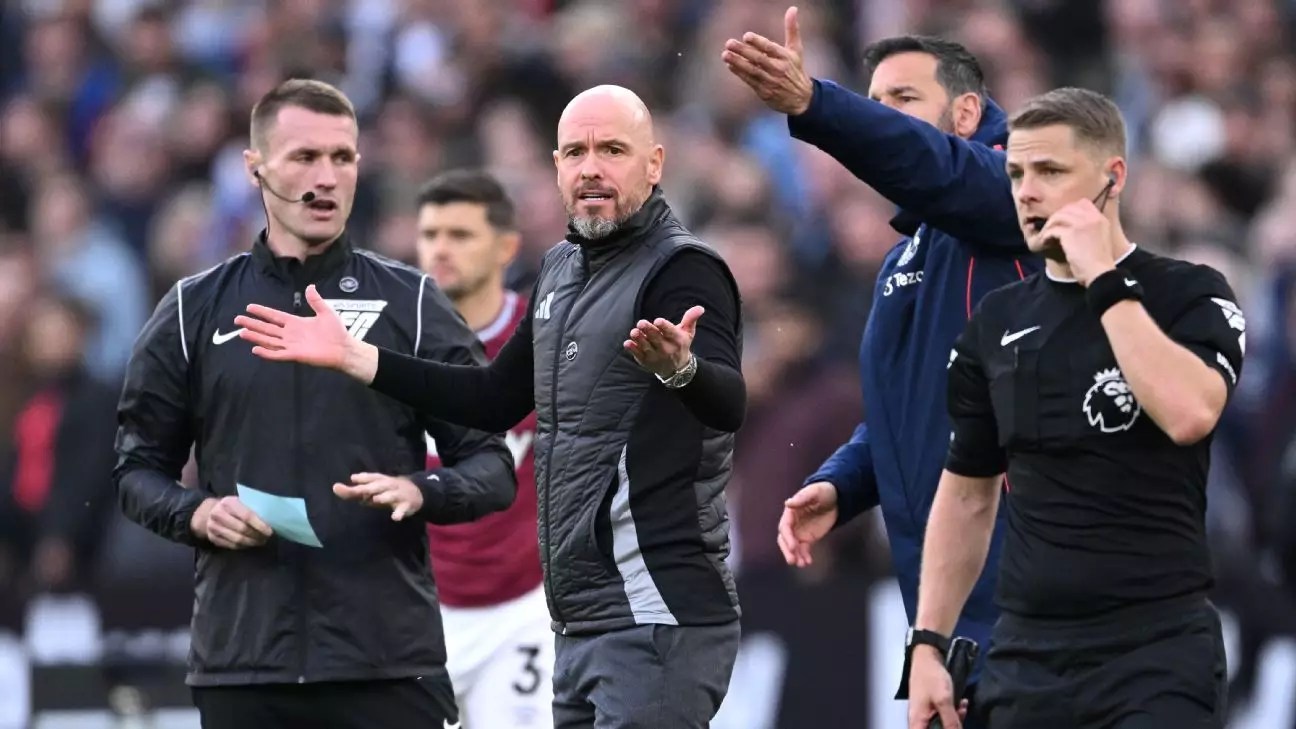In a disheartening display that further showcased Manchester United’s ongoing issues, the team fell to a 2-1 defeat against West Ham United, continuing a trend of frustrating performances that have begun to solidify under Erik ten Hag’s management. Following a chaotic match at the London Stadium, where a late penalty awarded to West Ham flipped the script after Manchester United had controlled the majority of the play, it became painfully clear that the team is grappling with deeper problems beyond just individual errors.
Ten Hag’s post-match sentiments illustrate the frustrations faced by many: he was quick to highlight the controversial penalty decision as a pivotal moment that altered the course of the game. His assertions that his team deserved more due to their early dominance echoed moments of denial rather than the accountability needed to address their repeating shortcomings. While it is valid to discuss officiating mistakes, deflecting blame from the players themselves does little to rectify the core issues plaguing the squad.
Unraveling Before Our Eyes
The events of the match painted a picture of a side that, despite showing intention and creativity in the first half, ultimately lost control both mentally and physically as the game progressed. After a promising start that featured opportunities designed and orchestrated by Bruno Fernandes, the team quickly lost their momentum. A combination of squandered chances and lackluster responses to pressure led to a calamitous outcome. Fernandes’ early setups for Alejandro Garnacho are prime examples of missed opportunities, a recurring theme for a squad laden with talent yet lacking the necessary clinical edge in critical moments.
As the match wore on, a palpable shift occurred; instead of executing their game plan, Manchester United found themselves chasing shadows. The introduction of tactical changes by West Ham’s coach, Julen Lopetegui, at halftime proved to be a game-changer. By reinforcing their attack and adjusting strategically, West Ham began to exploit gaps in United’s defense, showcasing the need for Ten Hag to react more decisively when conditions shift.
The statistics at the end of the match were telling. With Manchester United registering an expected goals (xG) of 1.48 while holding West Ham to a mere 0.04 during the first half, there were undeniable signs of dominance. However, as performance advanced to the later stages, a disappointing reality set in with the final xG tally showing the hosts improving to 2.98 and showcasing their newfound control. This glaring inconsistency points to a larger issue within the team’s structure and mental fortitude; being unable to convert strong starts into tangible results has plagued Ten Hag’s squad consistently.
Individual player performances have come under scrutiny as well. The struggles of key names such as Fernandes, who leads the league in shots without scoring, and Diogo Dalot, whose glaring miss in the match was too painful to ignore, reflect a troubling symptom of collective anxiety that radiates throughout the squad. The disparity in goals and assists between young prospects like Garnacho and experienced players such as Marcus Rashford speaks to an urgent need for improvement. Their inability to deliver in decisive moments heightens the stakes surrounding Ten Hag’s tenure as coach.
As Manchester United prepares to face incoming fixtures against Chelsea, Leicester City, Ipswich Town, and Everton, the pressing concern is whether Ten Hag can galvanize his players to adopt a mindset capable of transforming opportunities into victories. Historical trends suggest that the squad’s current level reflects a middle-tier status reminiscent of West Ham in previous seasons—good enough to compete but consistently falling short of greatness.
Realistically, attention must focus on performance outputs far beyond the scorelines and scrutiny of refereeing decisions. The narrative heading into matches must shift from reliance on VAR interventions and external factors to a rigorous analysis of technical proficiency and mental resolve.
In the Premier League, it is survival of the fittest, and without significant adjustments and a thorough understanding of how to consistently perform under pressure, it is imperative to ask whether Manchester United’s current trajectory can support the ambitions that the club’s legacy demands. With pressure mounting and results dwindling, Ten Hag must realize that change is not on the horizon; it is necessary to avoid further derailing the storied club’s aspirations.


Leave a Reply